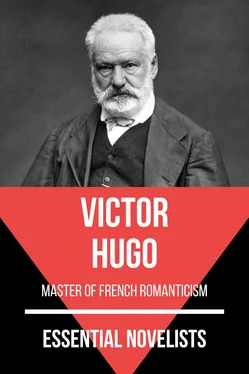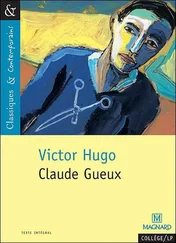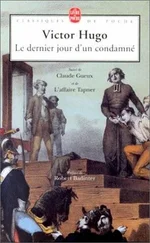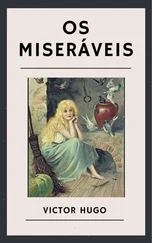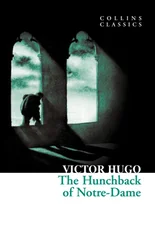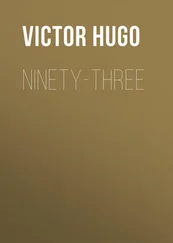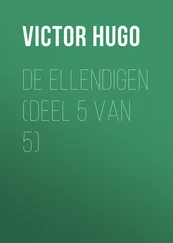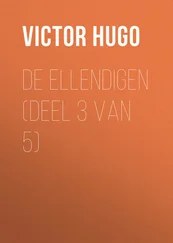At Genappe, an effort was made to wheel about, to present a battle front, to draw up in line. Lobau rallied three hundred men. The entrance to the village was barricaded, but at the first volley of Prussian canister, all took to flight again, and Lobau was taken. That volley of grape-shot can be seen to-day imprinted on the ancient gable of a brick building on the right of the road at a few minutes’ distance before you enter Genappe. The Prussians threw themselves into Genappe, furious, no doubt, that they were not more entirely the conquerors. The pursuit was stupendous. Blücher ordered extermination. Roguet had set the lugubrious example of threatening with death any French grenadier who should bring him a Prussian prisoner. Blücher outdid Roguet. Duhesme, the general of the Young Guard, hemmed in at the doorway of an inn at Genappe, surrendered his sword to a huzzar of death, who took the sword and slew the prisoner. The victory was completed by the assassination of the vanquished. Let us inflict punishment, since we are history: old Blücher disgraced himself. This ferocity put the finishing touch to the disaster. The desperate route traversed Genappe, traversed Quatre-Bras, traversed Gosselies, traversed Frasnes, traversed Charleroi, traversed Thuin, and only halted at the frontier. Alas! and who, then, was fleeing in that manner? The Grand Army.
This vertigo, this terror, this downfall into ruin of the loftiest bravery which ever astounded history,—is that causeless? No. The shadow of an enormous right is projected athwart Waterloo. It is the day of destiny. The force which is mightier than man produced that day. Hence the terrified wrinkle of those brows; hence all those great souls surrendering their swords. Those who had conquered Europe have fallen prone on the earth, with nothing left to say nor to do, feeling the present shadow of a terrible presence. Hoc erat in fatis. That day the perspective of the human race underwent a change. Waterloo is the hinge of the nineteenth century. The disappearance of the great man was necessary to the advent of the great century. Some one, a person to whom one replies not, took the responsibility on himself. The panic of heroes can be explained. In the battle of Waterloo there is something more than a cloud, there is something of the meteor. God has passed by.
At nightfall, in a meadow near Genappe, Bernard and Bertrand seized by the skirt of his coat and detained a man, haggard, pensive, sinister, gloomy, who, dragged to that point by the current of the rout, had just dismounted, had passed the bridle of his horse over his arm, and with wild eye was returning alone to Waterloo. It was Napoleon, the immense somnambulist of this dream which had crumbled, essaying once more to advance.
Chapter XIV
The Last Square
––––––––

SEVERAL SQUARES OF the Guard, motionless amid this stream of the defeat, as rocks in running water, held their own until night. Night came, death also; they awaited that double shadow, and, invincible, allowed themselves to be enveloped therein. Each regiment, isolated from the rest, and having no bond with the army, now shattered in every part, died alone. They had taken up position for this final action, some on the heights of Rossomme, others on the plain of Mont-Saint-Jean. There, abandoned, vanquished, terrible, those gloomy squares endured their death-throes in formidable fashion. Ulm, Wagram, Jena, Friedland, died with them.
At twilight, towards nine o’clock in the evening, one of them was left at the foot of the plateau of Mont-Saint-Jean. In that fatal valley, at the foot of that declivity which the cuirassiers had ascended, now inundated by the masses of the English, under the converging fires of the victorious hostile cavalry, under a frightful density of projectiles, this square fought on. It was commanded by an obscure officer named Cambronne. At each discharge, the square diminished and replied. It replied to the grape-shot with a fusillade, continually contracting its four walls. The fugitives pausing breathless for a moment in the distance, listened in the darkness to that gloomy and ever-decreasing thunder.
When this legion had been reduced to a handful, when nothing was left of their flag but a rag, when their guns, the bullets all gone, were no longer anything but clubs, when the heap of corpses was larger than the group of survivors, there reigned among the conquerors, around those men dying so sublimely, a sort of sacred terror, and the English artillery, taking breath, became silent. This furnished a sort of respite. These combatants had around them something in the nature of a swarm of spectres, silhouettes of men on horseback, the black profiles of cannon, the white sky viewed through wheels and gun-carriages, the colossal death’s-head, which the heroes saw constantly through the smoke, in the depths of the battle, advanced upon them and gazed at them. Through the shades of twilight they could hear the pieces being loaded; the matches all lighted, like the eyes of tigers at night, formed a circle round their heads; all the lintstocks of the English batteries approached the cannons, and then, with emotion, holding the supreme moment suspended above these men, an English general, Colville according to some, Maitland according to others, shouted to them, “Surrender, brave Frenchmen!” Cambronne replied, “——.”
––––––––
Chapter XV
Cambronne
––––––––
IF ANY FRENCH READER object to having his susceptibilities offended, one would have to refrain from repeating in his presence what is perhaps the finest reply that a Frenchman ever made. This would enjoin us from consigning something sublime to History.
At our own risk and peril, let us violate this injunction.
Now, then, among those giants there was one Titan,—Cambronne.
To make that reply and then perish, what could be grander? For being willing to die is the same as to die; and it was not this man’s fault if he survived after he was shot.
The winner of the battle of Waterloo was not Napoleon, who was put to flight; nor Wellington, giving way at four o’clock, in despair at five; nor Blücher, who took no part in the engagement. The winner of Waterloo was Cambronne.
To thunder forth such a reply at the lightning-flash that kills you is to conquer!
Thus to answer the Catastrophe, thus to speak to Fate, to give this pedestal to the future lion, to hurl such a challenge to the midnight rainstorm, to the treacherous wall of Hougomont, to the sunken road of Ohain, to Grouchy’s delay, to Blücher’s arrival, to be Irony itself in the tomb, to act so as to stand upright though fallen, to drown in two syllables the European coalition, to offer kings privies which the Cæsars once knew, to make the lowest of words the most lofty by entwining with it the glory of France, insolently to end Waterloo with Mardigras, to finish Leonidas with Rabellais, to set the crown on this victory by a word impossible to speak, to lose the field and preserve history, to have the laugh on your side after such a carnage,—this is immense!
It was an insult such as a thunder-cloud might hurl! It reaches the grandeur of Æschylus!
Cambronne’s reply produces the effect of a violent break. ‘Tis like the breaking of a heart under a weight of scorn. ‘Tis the overflow of agony bursting forth. Who conquered? Wellington? No! Had it not been for Blücher, he was lost. Was it Blücher? No! If Wellington had not begun, Blücher could not have finished. This Cambronne, this man spending his last hour, this unknown soldier, this infinitesimal of war, realizes that here is a falsehood, a falsehood in a catastrophe, and so doubly agonizing; and at the moment when his rage is bursting forth because of it, he is offered this mockery,—life! How could he restrain himself? Yonder are all the kings of Europe, the general’s flushed with victory, the Jupiter’s darting thunderbolts; they have a hundred thousand victorious soldiers, and back of the hundred thousand a million; their cannon stand with yawning mouths, the match is lighted; they grind down under their heels the Imperial guards, and the grand army; they have just crushed Napoleon, and only Cambronne remains,—only this earthworm is left to protest. He will protest. Then he seeks for the appropriate word as one seeks for a sword. His mouth froths, and the froth is the word. In face of this mean and mighty victory, in face of this victory which counts none victorious, this desperate soldier stands erect. He grants its overwhelming immensity, but he establishes its triviality; and he does more than spit upon it. Borne down by numbers, by superior force, by brute matter, he finds in his soul an expression: “Excrément!” We repeat it,—to use that word, to do thus, to invent such an expression, is to be the conqueror!
Читать дальше
